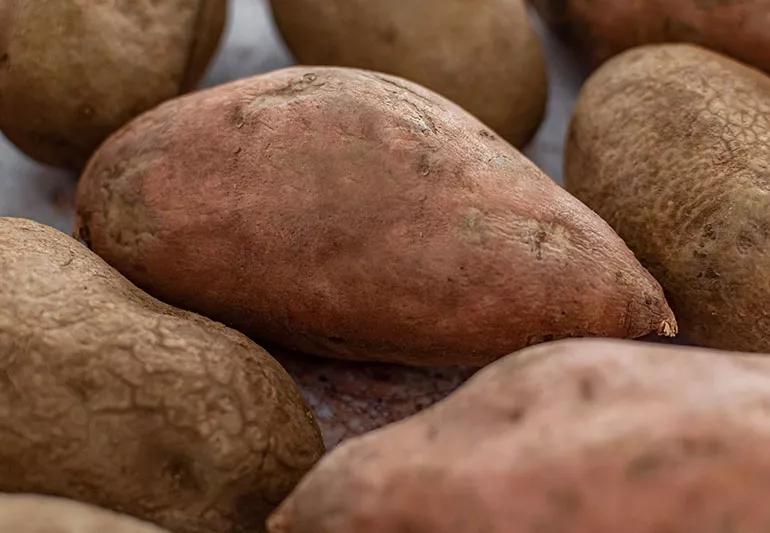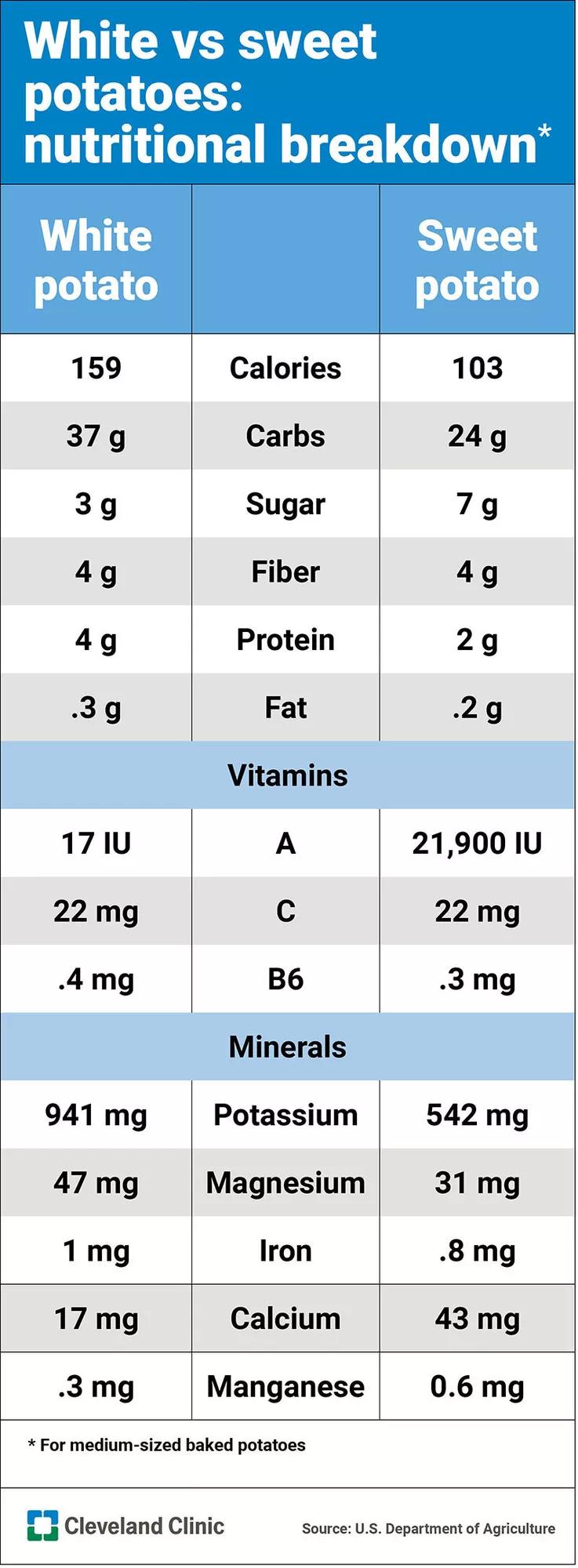Neither spud is a dud, but one offers just a bit more nutrition

Don’t be fooled by the last name: Regular potatoes and sweet potatoes aren’t exactly close family. They’re considered “distantly related” at best in the world of botanic genealogy, with some pretty big differences.
Advertisement
Cleveland Clinic is a non-profit academic medical center. Advertising on our site helps support our mission. We do not endorse non-Cleveland Clinic products or services. Policy
At the dinner table, though, they’re often viewed as side-dish siblings — right down to the rivalry over which one is more nutritious. There’s also plenty of arguing over which spud is yummier, of course.
To settle the debate — at least regarding which potato is the healthier option — we turn to registered dietitian Beth Czerwony, RD, LD. (You’re on your own for taste.)
Potatoes and sweet potatoes might not look all that impressive, but those oval-shaped vegetables rank as two of the world’s most-produced crops. Both are viewed as essential for global food security.
Farmers pulled more than 370 million metric tons of potatoes out of the ground in 2019. The total sweet potato harvest, meanwhile, reached almost 92 million metric tons during that same year.
“Potatoes and sweet potatoes are a diet staple around the world,” says Czerwony. “And aside from being healthy, they’re inexpensive and versatile in meals.”
Potatoes are part of the nightshade family, while sweet potatoes belong to the morning glory clan. Both are considered root vegetables, meaning the part of the plant you eat grows beneath the soil.
Regular potatoes have white or yellow flesh inside, while sweet potatoes are known for having orange innards. Both typically have brownish skin; though, that can vary depending on the variety.
Advertisement
There are more than 4,000 different types of potatoes and 1,000 varieties of sweet potatoes grown around the globe.
Let’s start with this basic fact: Potatoes and sweet potatoes bring a lot to the table when it comes to nutrition, says Czerwony. They’re both lower-calorie, low-fat foods that are rich in:
Here’s a side-by-side nutritional comparison:

Image content: This image is available to view online.
View image online (https://assets.clevelandclinic.org/transform/f19df93c-5ee8-4e89-b754-744fb45a4b2b/tables-HE-WhiteVsSweetPotatoes-1_jpg)
No matter how you peel away at this question, one thing is obvious — potatoes and sweet potatoes both qualify as healthy, nutritious foods. “Neither one of them is a bad choice,” says Czerwony.
But if you have to pick just one, sweet potatoes hold a slight edge, says Czerwony. The main reason? Beta carotene and vitamin A.
Sweet potatoes trace their colorful orange flesh to the presence of beta carotene, an antioxidant that works to protect your body’s cells from damage and diseases like cancer. Your body converts the beta carotene into off-the-charts levels of vitamin A.
“That’s the main reason why sweet potatoes come across as a little bit of a better option,” clarifies Czerwony. “But in the end, it comes down to personal preference.”
Her best advice? “Use them both. It’ll add some variety to your diet.”
While potatoes and sweet potatoes may be healthy, it’s also easy to turn potato-based food into a fatty calorie bomb. All the goodness in those spuds doesn’t cancel out the negatives that come with a dip in a deep fryer, for instance.
A 2017 study even found that eating fried potatoes twice a week increased your risk of death. That’s bad news given the amount of French fries and potato chips in many diets.
Advertisement
So, how should you cook potatoes or sweet potatoes to get the most benefit? Baking them causes the least reduction in nutrients, says Czerwony. Be careful with the toppings you add afterward, though … and make sure to eat the skin.
If you’re looking for ideas for healthier potato or sweet potato dishes, here are a few to try:
Healthier potato recipes
Healthier sweet potato recipes
Advertisement

Sign up for our Health Essentials emails for expert guidance on nutrition, fitness, sleep, skin care and more.
Learn more about our editorial process.
Advertisement

The tropical fruit is a good source of antioxidants and vitamin C

High amounts of cholesterol and saturated fat in red meat may be linked to heart disease

The leaves and pods from this tree are rich in essential nutrients

This starchy root vegetable is a staple in many global cuisines — but it has to be prepared correctly, or it can cause serious concerns

These delicate green sprouts can give you an extra dose of vitamin K and other nutrients — but they’re not safe for everyone

Edamame, lentils and chicken breast are good sources of protein

Eating this root vegetable can help support your eye, heart and brain health

The flavorful herb is full of antioxidants that may help regulate blood sugar

The tropical fruit is a good source of antioxidants and vitamin C

Most people fall asleep within 10 to 20 minutes, but if your experience is different, adjusting your sleep schedule may help

Exploring your hidden side can lead to better understanding of what makes you tick